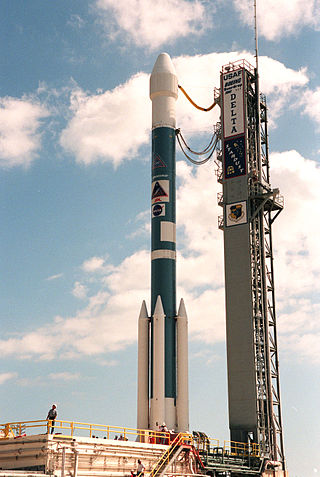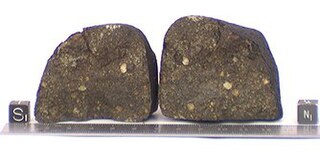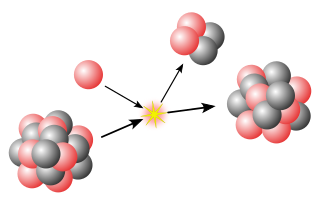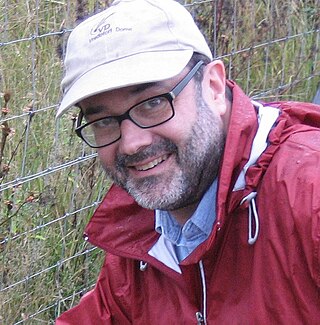Related Research Articles
Radiometric dating, radioactive dating or radioisotope dating is a technique which is used to date materials such as rocks or carbon, in which trace radioactive impurities were selectively incorporated when they were formed. The method compares the abundance of a naturally occurring radioactive isotope within the material to the abundance of its decay products, which form at a known constant rate of decay. The use of radiometric dating was first published in 1907 by Bertram Boltwood and is now the principal source of information about the absolute age of rocks and other geological features, including the age of fossilized life forms or the age of Earth itself, and can also be used to date a wide range of natural and man-made materials.

The age of Earth is estimated to be 4.54 ± 0.05 billion years (4.54 × 109 years ± 1%). This age may represent the age of Earth's accretion, or core formation, or of the material from which Earth formed. This dating is based on evidence from radiometric age-dating of meteorite material and is consistent with the radiometric ages of the oldest-known terrestrial material and lunar samples.

Presolar grains are interstellar solid matter in the form of tiny solid grains that originated at a time before the Sun was formed. Presolar stardust grains formed within outflowing and cooling gases from earlier presolar stars.

Cosmochemistry or chemical cosmology is the study of the chemical composition of matter in the universe and the processes that led to those compositions. This is done primarily through the study of the chemical composition of meteorites and other physical samples. Given that the asteroid parent bodies of meteorites were some of the first solid material to condense from the early solar nebula, cosmochemists are generally, but not exclusively, concerned with the objects contained within the Solar System.
Meteoritics is the science that deals with meteors, meteorites, and meteoroids. It is closely connected to cosmochemistry, mineralogy and geochemistry. A specialist who studies meteoritics is known as a meteoriticist.
George Wetherill was a physicist and geologist and the director emeritus of the department of terrestrial magnetism at the Carnegie Institution of Washington, DC, US.
Thomas Edvard "Tom" Krogh, FRSC was a geochronologist and a former curator for the Royal Ontario Museum. He revolutionized the technique of radiometric uranium-lead dating with the development of new laboratory procedures and analytical methodologies. His discoveries have yielded an unprecedented level of precision in the dating of Precambrian rocks. Krogh's techniques have become the international de facto standard. The application of these techniques has provided a detailed understanding of the evolution of the Earth's Precambrian shield areas.
Gerald J. Wasserburg was an American geologist. At the time of his death, he was the John D. MacArthur Professor of Geology and Geophysics, emeritus, at the California Institute of Technology. He was known for his work in the fields of isotope geochemistry, cosmochemistry, meteoritics, and astrophysics.

Thermochronology is the study of the thermal evolution of a region of a planet. Thermochronologists use radiometric dating along with the closure temperatures that represent the temperature of the mineral being studied at the time given by the date recorded to understand the thermal history of a specific rock, mineral, or geologic unit. It is a subfield within geology, and is closely associated with geochronology.

A radiogenic nuclide is a nuclide that is produced by a process of radioactive decay. It may itself be radioactive or stable.

Donald James DePaolo is an American professor of geochemistry in the department of earth and planetary science at the University of California, Berkeley and associate laboratory director for energy and environmental sciences at the Lawrence Berkeley National Laboratory.

François Robert, born in Paris, France the 26th of January, 1951, is a French researcher specializing in isotope geochemistry and cosmochemistry. His work on the isotopes of hydrogen has enhanced the understanding of the origin of water and of organic matter in the solar system. He is famous for his work on lithium, beryllium and boron, light elements formed by the irradiation of interstellar matter. He received a Leonard Medal from the Meteoritical Society in 2011 for his work on the isotopic composition of stable nuclei.

Christian Köberl is a professor of impact research and planetary geology at the University of Vienna, Austria. From June 2010 to May 2020 he was director general of the Natural History Museum in Vienna. He is best known for his research on meteorite impact craters.
Robert Norman Clayton was a Canadian-American chemist and academic. He was the Enrico Fermi Distinguished Service Professor Emeritus of Chemistry at the University of Chicago. Clayton studied cosmochemistry and held a joint appointment in the university's geophysical sciences department. He was a member of the National Academy of Sciences and was named a fellow of several academic societies, including the Royal Society.
Kunchithapadam Gopalan is an Indian geochronologist and a former emeritus scientist at National Geophysical Research Institute. He is known for his studies on the chronologies of critical rock suites of the Indian subcontinent and is an elected fellow of the Indian Academy of Sciences, Indian National Science Academy, Indian Geophysical Union and the National Academy of Sciences, India. The Council of Scientific and Industrial Research, the apex agency of the Government of India for scientific research, awarded him the Shanti Swarup Bhatnagar Prize for Science and Technology, one of the highest Indian science awards for his contributions to earth, atmosphere, ocean and planetary sciences in 1982.

Barbara Cohen is a planetary scientist at NASA's Goddard Space Flight Center. The asteroid 6816 Barbcohen is named after her.
Gas-rich meteorites are meteorites with high levels of primordial gases, such as helium, neon, argon, krypton, xenon and sometimes other elements. Though these gases are present "in virtually all meteorites," the Fayetteville meteorite has ~2,000,000 x10−8 ccSTP/g helium, or ~2% helium by volume equivalent. In comparison, background level is a few ppm.
Ghislaine Crozaz is a cosmochemist known for her research on the early history of the solar system through tracking trace elements in meteorites.
Louis Herman Ahrens was a South African born geochemist, academic, and author. Best known for his work in the 1950s in establishing a method of using rubidium–strontium dating as a means of geochronology.
Nicolas Dauphas is a planetary scientist and isotope geochemist. He is a professor of geochemistry and cosmochemistry in the Department of the Geophysical Sciences and Enrico Fermi Institute at the University of Chicago, where he was previously a Louis Block professor, being appointed to that professorship in 2016. His research focuses on isotope geochemistry and cosmochemistry. He studies the origin and evolution of planets and other objects in the solar system by analyzing the natural distributions of elements and their isotopes using mass spectrometers.
References
- Debrett's People of Today, 2006
- Who's Who , 2006
- The Observatory, October 2005, p285-6